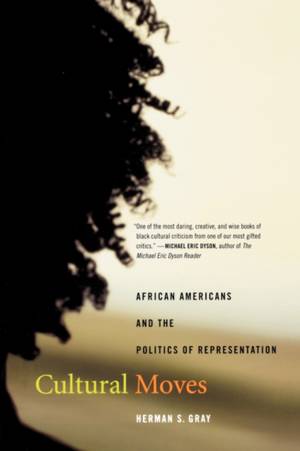
- Afhalen na 1 uur in een winkel met voorraad
- Gratis thuislevering in België vanaf € 30
- Ruim aanbod met 7 miljoen producten
- Afhalen na 1 uur in een winkel met voorraad
- Gratis thuislevering in België vanaf € 30
- Ruim aanbod met 7 miljoen producten
Zoeken
€ 59,45
+ 118 punten
Omschrijving
Herman Gray takes a sweeping look at black popular culture over the past decade to explore culture's role in the push for black political power and social recognition. In a series of linked essays, he finds that black artists, scholars, musicians, and others have been instrumental in reconfiguring social and cultural life in the United States and he provocatively asks how black culture can now move beyond a preoccupation with inclusion and representation.
Gray considers how Wynton Marsalis and his creation of a jazz canon at Lincoln Center acted to establish cultural visibility and legitimacy for jazz. Other essays address such topics as the work of the controversial artist Kara Walker; the relentless struggles for representation on network television when those networks are no longer the primary site of black or any other identity; and how black musicians such as Steve Coleman and George Lewis are using new technology to shape and extend black musical traditions and cultural identities.
Gray considers how Wynton Marsalis and his creation of a jazz canon at Lincoln Center acted to establish cultural visibility and legitimacy for jazz. Other essays address such topics as the work of the controversial artist Kara Walker; the relentless struggles for representation on network television when those networks are no longer the primary site of black or any other identity; and how black musicians such as Steve Coleman and George Lewis are using new technology to shape and extend black musical traditions and cultural identities.
Specificaties
Betrokkenen
- Auteur(s):
- Uitgeverij:
Inhoud
- Aantal bladzijden:
- 257
- Taal:
- Engels
- Reeks:
- Reeksnummer:
- nr. 15
Eigenschappen
- Productcode (EAN):
- 9780520241442
- Verschijningsdatum:
- 14/02/2005
- Uitvoering:
- Paperback
- Formaat:
- Trade paperback (VS)
- Afmetingen:
- 153 mm x 229 mm
- Gewicht:
- 376 g

Alleen bij Standaard Boekhandel
+ 118 punten op je klantenkaart van Standaard Boekhandel
Beoordelingen
We publiceren alleen reviews die voldoen aan de voorwaarden voor reviews. Bekijk onze voorwaarden voor reviews.











